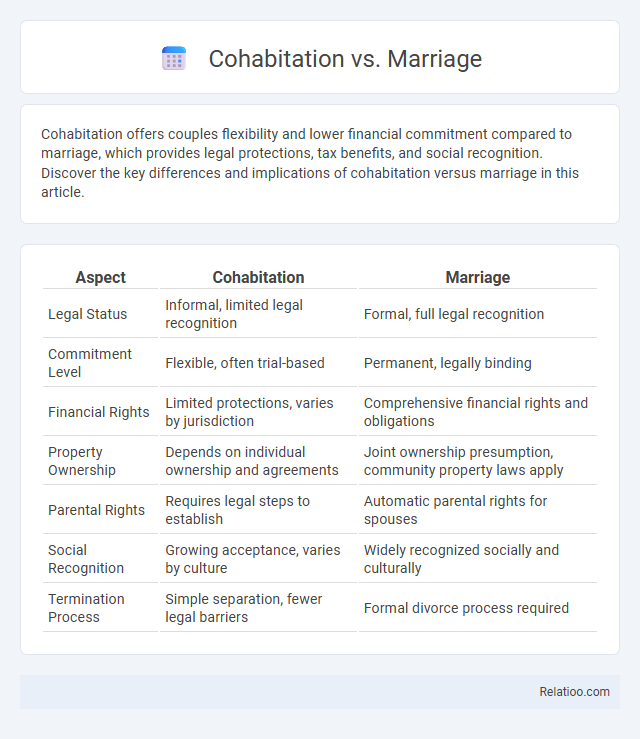Cohabitation offers couples flexibility and lower financial commitment compared to marriage, which provides legal protections, tax benefits, and social recognition. Discover the key differences and implications of cohabitation versus marriage in this article.
Table of Comparison
| Aspect | Cohabitation | Marriage |
|---|---|---|
| Legal Status | Informal, limited legal recognition | Formal, full legal recognition |
| Commitment Level | Flexible, often trial-based | Permanent, legally binding |
| Financial Rights | Limited protections, varies by jurisdiction | Comprehensive financial rights and obligations |
| Property Ownership | Depends on individual ownership and agreements | Joint ownership presumption, community property laws apply |
| Parental Rights | Requires legal steps to establish | Automatic parental rights for spouses |
| Social Recognition | Growing acceptance, varies by culture | Widely recognized socially and culturally |
| Termination Process | Simple separation, fewer legal barriers | Formal divorce process required |
Introduction to Cohabitation and Marriage
Cohabitation and marriage represent two distinct societal and legal frameworks for long-term partnerships. Cohabitation involves living together without formal legal or religious recognition, often reflecting evolving social norms and increasing acceptance of non-marital unions. Marriage, traditionally recognized through legal and religious institutions, provides specific rights, responsibilities, and social legitimacy that influence relationship stability and longevity.
Historical Perspectives on Living Together
Historical perspectives reveal that cohabitation was once stigmatized and legally restricted, contrasting with the socially and religiously endorsed institution of marriage. Over centuries, societal norms evolved, leading to increased acceptance of couples living together without formal marriage, especially evident in Western societies since the late 20th century. Research indicates that while marriage has traditionally been linked to greater longevity and health benefits, the gap narrows as cohabitation gains legal recognition and social support.
Legal Differences Between Cohabitation and Marriage
Legal differences between cohabitation and marriage significantly impact property rights, inheritance, and spousal benefits. Unlike marriage, cohabitation often lacks automatic legal protections such as joint ownership, tax benefits, and decision-making authority in medical emergencies. Understanding these distinctions ensures your rights and obligations are clear, reducing potential conflicts in long-term relationships.
Financial Implications: Cohabitation vs Marriage
Cohabitation often involves fewer legal and financial protections compared to marriage, affecting asset division, tax benefits, and inheritance rights. Married couples typically access spousal benefits like joint tax filings, social security, and pension survivorship, which can enhance long-term financial stability. Understanding these financial implications can help you make informed decisions about your living arrangements and future security.
Emotional and Psychological Aspects
Cohabitation often offers emotional flexibility but may lack the long-term psychological security found in marriage, which is linked to greater emotional stability and well-being over time. Studies indicate married individuals report higher levels of emotional support and reduced stress compared to those cohabiting without formal commitment. Longevity in relationships, whether through marriage or committed cohabitation, correlates with improved mental health outcomes and resilience against emotional challenges.
Social Stigma and Cultural Acceptance
Cohabitation faces varying degrees of social stigma depending on cultural contexts, with many societies historically favoring marriage as a symbol of stability and legitimacy. Marriage tends to receive broader cultural acceptance and legal recognition, often linked to enhanced social support and perceived longevity of relationships. Studies indicate that despite increasing acceptance of cohabitation, deeply ingrained social norms still influence perceptions, impacting relationship durability and societal integration.
Impact on Children and Family Dynamics
Cohabitation, marriage, and longevity each uniquely influence children's development and family dynamics, with marriage often providing more stability and long-term commitment benefiting emotional security. Studies reveal that children raised in long-lasting married households tend to exhibit better academic performance and social behavior compared to those from cohabiting or less stable unions. Family dynamics in marriage frequently offer clearer roles and legal protections, which can contribute to a more consistent environment for child-rearing.
Relationship Longevity and Stability
Research indicates that marriage generally offers greater relationship longevity and stability compared to cohabitation, with married couples showing higher commitment levels and more robust legal protections. Cohabiting couples face increased risk of breakup and less social recognition, which can contribute to lower relationship stability over time. Studies highlight that the intentional commitment and societal support embedded in marriage frameworks significantly enhance long-term relationship durability.
Rights and Responsibilities of Partners
Cohabitation often provides limited legal rights and responsibilities compared to marriage, as many jurisdictions do not automatically recognize cohabiting partners in areas like inheritance, tax benefits, or spousal support. Marriage legally binds partners with comprehensive rights and duties, including property division, decision-making authority in medical situations, and entitlement to social security benefits. Longevity in either arrangement can influence the extent of emotional and financial interdependence but does not necessarily alter the formal legal framework protecting partners.
Choosing What's Right: Factors to Consider
Choosing between cohabitation and marriage impacts your relationship's longevity, with factors such as legal benefits, financial security, and emotional commitment playing crucial roles. Research indicates that married couples often experience longer-lasting unions due to formalized commitments, while cohabiting couples may face more uncertainty without legal protections. Evaluating your values, communication patterns, and future goals will help determine which arrangement best supports your personal and relational well-being.

Infographic: Cohabitation vs Marriage
 relatioo.com
relatioo.com